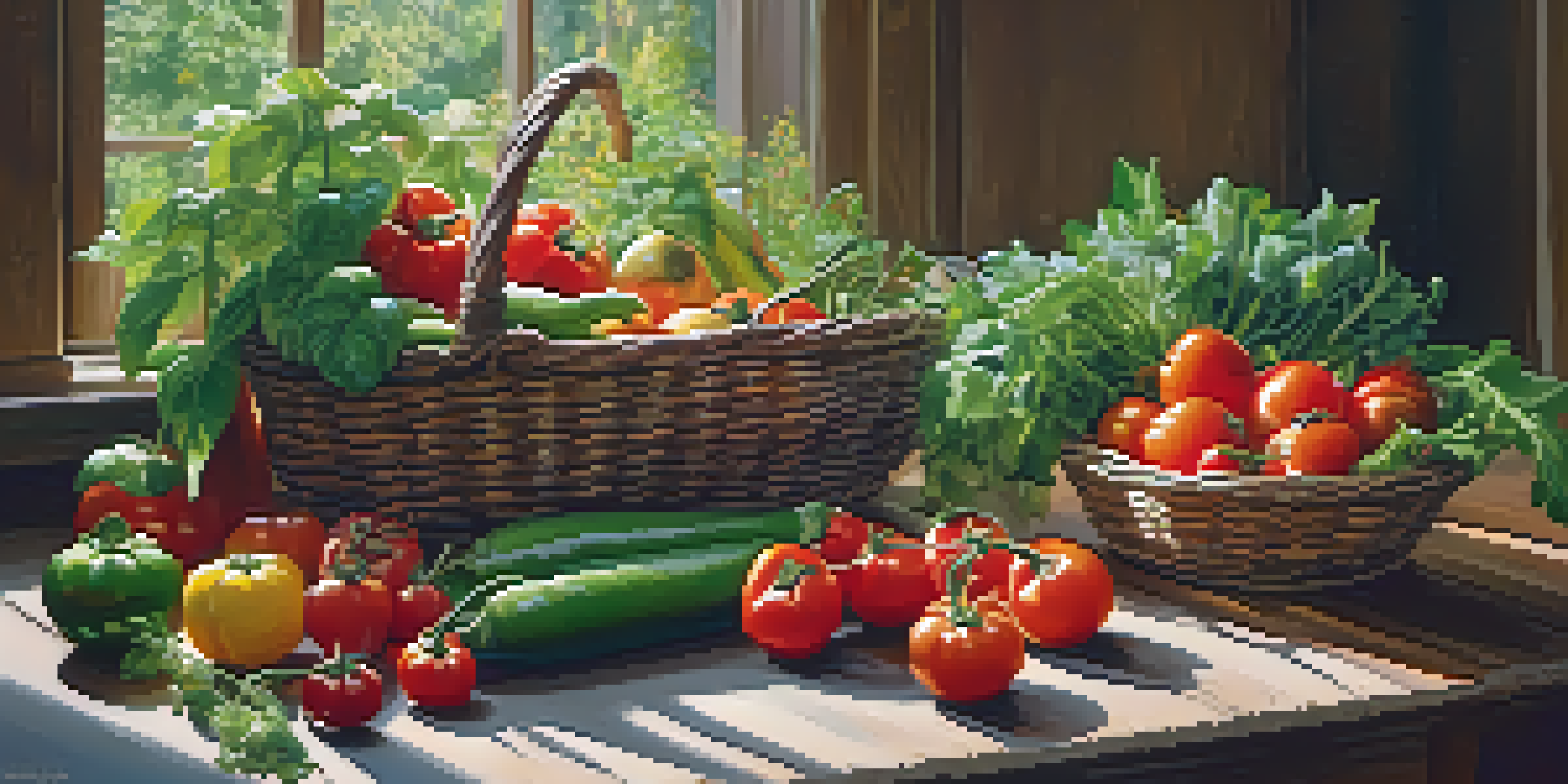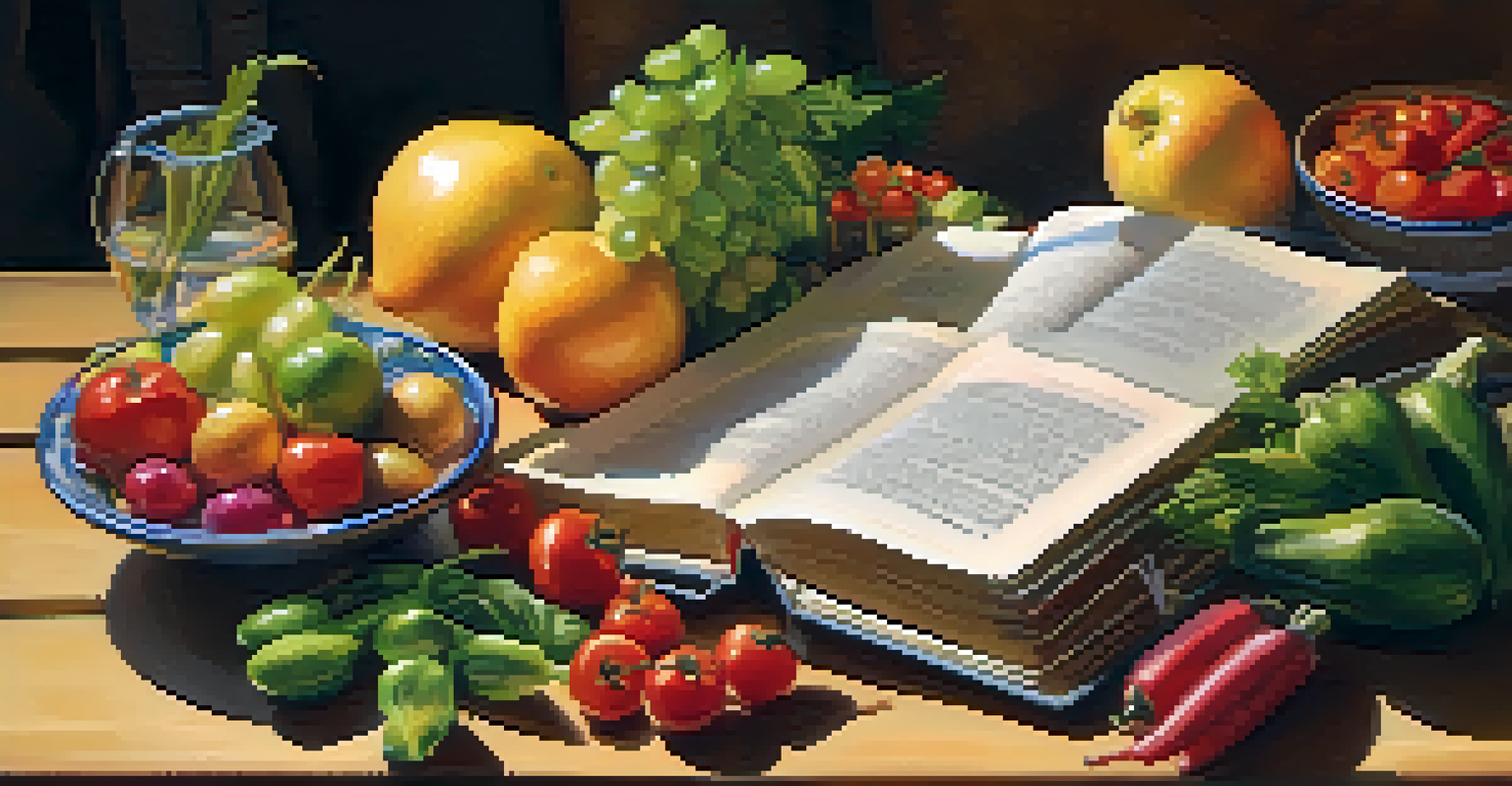The Impact of Vegetarianism in Literature: A Cultural Shift

Understanding Vegetarianism's Roots in Literature
Vegetarianism has a rich history in literature, often tied to philosophical beliefs and cultural practices. Many ancient texts, including those from Eastern philosophies, advocate for plant-based diets as a means of spiritual purity. This connection between vegetarianism and ethical living laid the groundwork for its portrayal in later literary works.
The diet of the future is a vegetarian diet, and it is the only sustainable diet for the planet.
As we delve into different cultures, we find that vegetarianism often reflects a broader understanding of humanity's relationship with nature. Writers have used vegetarianism as a narrative device to explore themes of compassion, sustainability, and health. This intersection of ethics and diet has significantly shaped literary discussions over the centuries.
From the works of ancient poets to modern novelists, vegetarianism serves as a lens through which authors examine societal values. This literary exploration not only highlights individual choices but also prompts readers to reflect on their dietary practices and ethical considerations.
Key Literary Works That Highlight Vegetarianism
Several literary works explicitly engage with vegetarianism, serving as cultural commentaries. One notable example is 'The Jungle' by Upton Sinclair, which critiques the meatpacking industry and advocates for a more humane approach to food production. This powerful narrative has ignited discussions on ethics and diet, prompting readers to rethink their food choices.

Another poignant example is the novel 'The Vegetarian' by Han Kang. This story delves into the life of a woman who decides to give up meat, leading to profound consequences in her personal relationships. It beautifully illustrates how dietary choices can ripple through one’s life, affecting not just the individual but their surroundings as well.
Literature Reflects Ethical Eating
Vegetarianism in literature often serves as a lens for exploring themes of ethics, compassion, and societal values.
These literary works exemplify how vegetarianism can serve as a catalyst for broader discussions about societal norms and ethical dilemmas. By weaving the theme of vegetarianism into their narratives, authors challenge readers to confront uncomfortable truths about their consumption habits.
The Symbolism of Vegetarianism in Modern Narratives
In contemporary literature, vegetarianism often symbolizes a rejection of societal norms. Characters who embrace a plant-based diet frequently stand out as rebels or visionaries, challenging the status quo. This narrative device allows authors to explore themes of individuality and social justice, making vegetarianism a powerful symbol in modern storytelling.
We need to think about the future of our planet and the future of our health. It’s not just about what we eat, it’s about how we live.
Moreover, vegetarianism is portrayed as a form of self-care and empowerment. Many characters adopt this lifestyle as a means of reclaiming their agency, choosing health and sustainability over tradition. Through these stories, readers are encouraged to consider their own dietary choices in a light that emphasizes personal well-being and environmental responsibility.
The symbolic use of vegetarianism highlights the growing cultural shift towards conscious eating. As more authors incorporate these themes into their work, they contribute to a larger dialogue about health, ethics, and the impact of our choices on the world around us.
Vegetarianism and Environmental Consciousness in Literature
Literature has long been a platform for discussing environmental issues, and vegetarianism plays a significant role in these narratives. As the consequences of climate change become increasingly evident, many authors are using vegetarianism as a way to spotlight sustainable living. This focus reflects a growing awareness of the environmental impact of meat consumption.
Writers like Barbara Kingsolver in 'Animal, Vegetable, Miracle' advocate for local, sustainable food systems, emphasizing the importance of plant-based diets. Such works encourage readers to consider how their food choices affect not just their health but also the planet. This environmental consciousness interwoven with vegetarian themes fosters a deeper understanding of our responsibilities.
Cultural Diversity in Diet Choices
Global literature showcases vegetarianism through various cultural perspectives, emphasizing its connection to identity and tradition.
By integrating vegetarianism into narratives centered around environmentalism, authors inspire readers to take action. This alignment of dietary choices with ecological awareness has become a hallmark of contemporary literature, highlighting the urgent need for sustainable living practices.
The Role of Vegetarianism in Feminist Literature
Feminist literature often intersects with themes of vegetarianism, exploring the connections between diet, body autonomy, and societal expectations. Many feminist writers argue that vegetarianism can serve as a form of resistance against patriarchal norms that dictate women's roles, especially in relation to food and family. By choosing plant-based diets, women reclaim power over their bodies and choices.
In works like 'Diet for a New America' by John Robbins, the conversation shifts to how dietary choices affect women's health and empowerment. This approach encourages women to prioritize their well-being, challenging traditional roles that often prioritize family meals centered around meat. Such narratives are crucial in promoting a dialogue about health and body image.
The intertwining of vegetarianism and feminism in literature invites readers to reflect on the broader implications of their food choices. Through these stories, authors highlight the importance of autonomy and self-determination, encouraging women to define their identities beyond societal expectations.
Cultural Reflections of Vegetarianism in Global Literature
Across the globe, vegetarianism is depicted in diverse ways, influenced by cultural beliefs and practices. In Indian literature, for example, vegetarianism is deeply rooted in religious and ethical traditions, often celebrated as a means of spiritual purity. These cultural reflections enrich the literary landscape, showcasing the varied reasons behind dietary choices.
Authors like Arundhati Roy in 'The God of Small Things' subtly introduce vegetarianism as part of the characters' identities, reflecting their cultural backgrounds. This representation offers readers insight into how food choices can signify belonging and cultural pride. Such narratives foster appreciation for the rich tapestry of dietary practices around the world.
Future Trends in Vegetarian Narratives
As awareness of health and sustainability grows, future literary works will likely continue to explore vegetarianism's role in contemporary issues.
By exploring vegetarianism through a cultural lens, literature becomes a powerful tool for understanding and appreciating diversity. These stories invite readers to engage with global perspectives, encouraging a more inclusive dialogue about food and ethics.
The Future of Vegetarianism in Literature
As society evolves, so too does the representation of vegetarianism in literature. With increasing awareness around health, sustainability, and ethical consumption, future literary works are likely to continue exploring these themes. Authors may increasingly use vegetarianism to tackle pressing issues, from climate change to social justice, weaving deeper narratives that reflect contemporary concerns.
Moreover, the rise of plant-based diets in popular culture will likely influence literature, inspiring new stories that center around these lifestyles. As more people adopt vegetarianism for various reasons, authors will have a rich well of experiences to draw from. This shift presents exciting opportunities for creative storytelling.

Ultimately, the future of vegetarianism in literature holds promise for continued cultural dialogue. As writers embrace these themes, they not only reflect societal changes but also inspire readers to engage with their dietary choices and consider their broader implications.